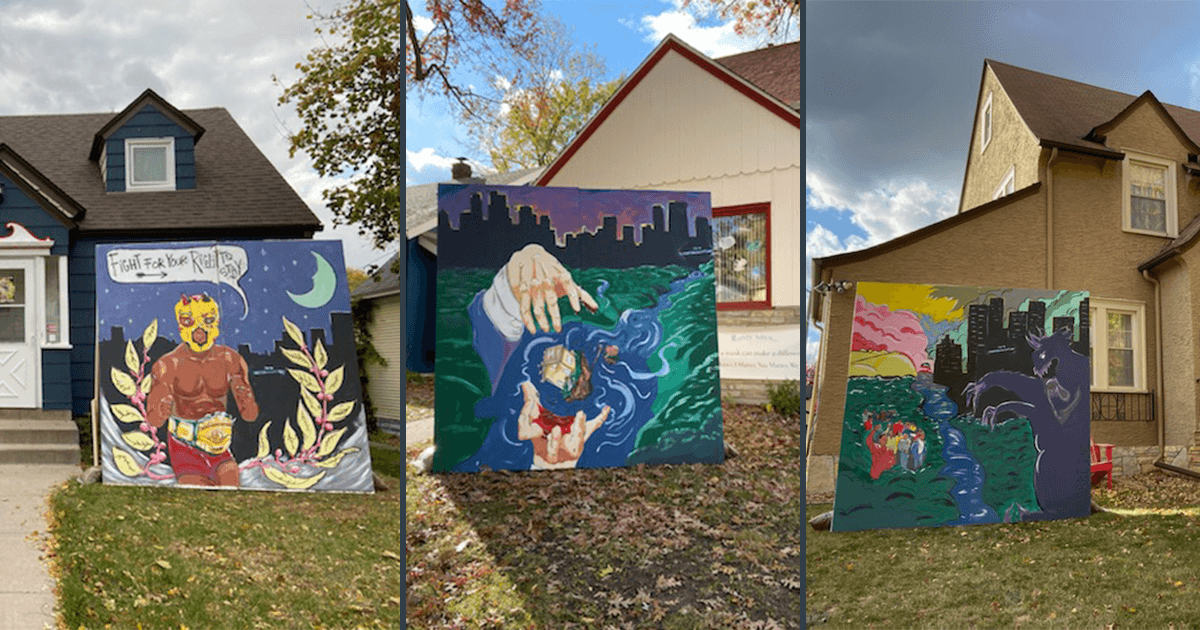Upper Harbor Terminal public comment process begins
Now through January 15, community members can weigh in on the draft plan for this city-owned, riverfront land. (Photo by Tom Reiter for FMR)
After years of planning and community debate, the city of Minneapolis has released its draft coordinated development plan for the city-owned Upper Harbor Terminal (UHT) site on the North Minneapolis riverfront.
This 48-acre parcel includes nearly a mile of Mississippi riverfront. FMR has been closely following the planning process — and the controversy surrounding it — for many years.
The city is soliciting public comments on the draft plan through January 15. After the comment period closes, the city may make revisions to the coordinated plan before the city council is asked to vote on it. The city council is scheduled to make their final vote on the plan in late February.
We encourage advocates to participate in this public comment period before the January 15 deadline. After that, we will also be encouraging advocates to continue contacting their city councilmembers before they vote on the plan.
Key questions and concerns persist
FMR has consistently opposed this development plan since early concepts were released over two years ago. We've worked with many community members and organizations to advocate for a better plan that brings more equitable outcomes and less risk of displacement for North Minneapolis residents.
We've been disappointed by the city-led planning and engagement process over the past few years. The engagement process has intentionally limited residents' ability to question certain elements of the plan (namely the concert venue).
Most of the planning has been narrowly centered around a Collaborative Planning Committee that has experienced controversy including member resignations and attempts to prevent the media from fully reporting on their work. The primary participation opportunities offered for residents have been "community learning tables" that have been inaccessible in a variety of ways (ranging from the four-hour meeting length to the lack of inclusion for non-English speakers).
We're reviewing the coordinated plan and will share our full comments when they're available. Here are some of our key questions and concerns:
-
This is a significant site on what will soon be prime riverfront land, owned by a city well-known for its inequities. This could have been an incredible opportunity for creative and equitable development, but instead the city went by the same old playbook of letting private developers dictate what gets built.
Why should a wealthy, white-led development team drive the vision here? Why not be more creative and work with the mostly Black and brown neighbors who have the most to lose or gain from this public project? The financial returns promised to the neighborhood (a $3 fee added on to First Avenue's tickets and ground lease revenues) don't seem proportionate to the level of financial benefit the private development team is reaping from the use of public land and public funds. - The coordinated plan has some glaring gaps. The environmental review (called an AUAR, or Alternative Urban Areawide Review) won't be released until after the city council is scheduled to vote on the plan. Other important details, like the Community Benefits Agreements and redevelopment agreements, are not yet complete. We're being asked to approve and commit to an incomplete plan that leaves many crucial questions unanswered.
-
We're still concerned about the First Avenue-managed concert venue, as we always have been. During the past 18 months of coordinated plan development, community members have never been permitted to critically examine whether they want a 7,000-10,000 person concert venue in their neighborhood. And persistent, important questions remain. We still don't know the noise and traffic impacts of the current plan, whether the jobs created will have stable schedules and pay living wages, and whether this project is financially sound. We're disappointed that the city prioritized this as their top priority for state bond funds in 2020, and equally disappointed that the Legislature awarded $12.5 million in public funds for it.
- It's not clear how much more public funding will be needed to develop the entire site to achieve desired affordability in housing and commercial/community spaces. What financial resources need to be marshalled, and will they be sufficient to really deliver on these goals?
- The plan proposes exemptions from the building height limits set out in the city's new Mississippi River Corridor Critical Area (MRCCA) ordinance. It's disappointing to see prompt disregard for these brand-new standards, intended to promote river-oriented design, community connections to the river and environmental sustainability. We believe that North Minneapolis should have the same high standard of riverfront development that the rest of the city enjoys.

Artists and organizers Sebastian Rivera and Ricardo Perez created these traveling murals to highlight gentrification and other community concerns about UHT.
Get involved
There are several ways to learn more about UHT in the coming weeks and get involved in the public comment process. The Minneapolis city council will be primarily interested in hearing from Minneapolis residents during this time, though we welcome anyone interested in attending our upcoming webinar. We urge you to invite your Minneapolis friends, family and neighbors to join us:
- Minneapolis residents, you can share your comments about the project with city staff and councilmembers using our handy form.
- Read FMR's full comment letter on the draft plan.
- Become an FMR River Guardian to be alerted to future opportunities to weigh in on the project.
- Learn more: Check out our extensive set of UHT articles and updates and follow our UHT Twitter account, @UHTspotlight.
